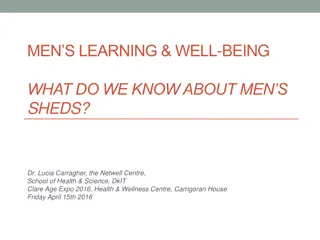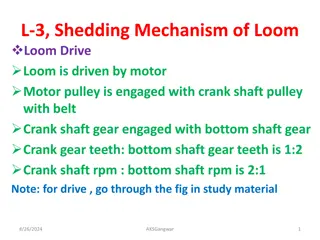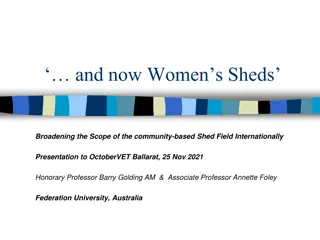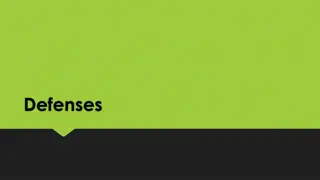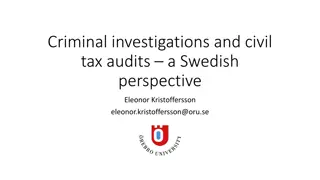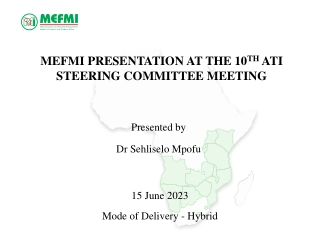Exploring International Collaboration Opportunities in Men's Sheds Research
Delve into the world of Men's Sheds and their impact on communities globally, guided by Professor Barry Golding. Discover the diverse research methodologies and interdisciplinary connections of Men's Sheds while exploring their local and international reach through active collaboration and publishing efforts.
Download Presentation

Please find below an Image/Link to download the presentation.
The content on the website is provided AS IS for your information and personal use only. It may not be sold, licensed, or shared on other websites without obtaining consent from the author. Download presentation by click this link. If you encounter any issues during the download, it is possible that the publisher has removed the file from their server.
E N D
Presentation Transcript
Researching Mens Sheds Opportunities for international collaboration Federation University School of Education 2020 OctoberVET by ZOOM Wed, Monday 16 Nov 6-8pm AEST Professor (Adjunct) Barry Golding AM b.golding@federation.edu.au
Intentions Introduce Men s Sheds in community settings. Identify how Men s Sheds research: cuts across disciplines uses diverse methodologies lends itself to publishing and blogging leads to local and internationally impact connects with other researchers.
Barry Golding: Introduction Retired from paid Fed Uni (Mt Helen) for 5+ years. Still Federation University Professor (Adjunct). Main research adult, community & informal learning. Dreamed up OctoberVET many years ago Specialist in older men s learning & Men s Sheds. Books: Men learning through life (2013) with Annette Foley and Rob Mark & Men s Shed Movement: The Company of Men (2015). Currently researching & writing new book, Shoulder to Shoulder: Broadening the Men s Shed Movement for publication in 2021. Actively researching & publishing with Annette Foley. Maintain an active WordPress website www.barrygoanna.com & regularly post blogs.
Tongala Mens Shed, Victoria Opened as Dick McGowan Men s Shed, July 1998: First in the world by that name.
Clems Shed, Minlaton South Australia (open 2001) Illustrating intersection between gender, age, health, war service, work for the dole
Early New Zealand Sheds Bloke s Sheds, Taieri & Dunedin South, 2007 Hamilton Community Men s Shed, 2008
Louth & North Belfast Mens Sheds, Ireland Now community collaboration in communities both sides of the border wracked by sectarian violence until two decades ago.
To 2020, approx. 2,670 Mens Sheds open approx., pre-COVID Australia * 1,258 UK * 750+ Ireland * 450+ NZ * 108 Denmark * 40 Canada * 35 US * 17 Kenya 8 Iceland 4 * with National Men s Shed Associations; also Scotland & Wales
Mens Shed basics All men are welcome to participate (sometimes also women). There is no right way or preferred activity aside from what participants & local community decides. It is a creative, participative journey for men & communities. The benefit is from active, positive connection & participation, not information or shame about health problems or deficit. Men are empowered as equal participants in an activity: not customers, clients, patients or students. Men generously share what they know & can do. Men s Sheds reflect the diverse communities, men and women, that support them. It works because there is no prescription or obligation. It is safe, homely & salutogenic (health-promoting). It involves mainly older men in communities of practice It reaches and engages men who have proved difficult to reach by top-down, programmatic interventions.
Research from Mens Sheds shows that: Men most in need are those less likely to access or respond to highly literate, online message. Missionary approaches from reformed men, academics, governments & experts are likely to turn older men off. Publicity to participate should encourage men to have a look informally, not to sign up. Images and messages should be inclusive of and attractive to the diversity amongst men. Top down health information & exhortations are less effective than local, informal shared experience. Research participants and the Shed must be empowered and involved in the research process. The Men s Shed works because all that is defined is the place (a locality & Shed) and (the company of other) Men.
Mens Sheds lend themselves to: research cutting across disciplines diverse methodologies making research impactful publishing and blogging negotiating the academic / proponent interface with Sheds, Shed Associations acting locally collaborating internationally connecting with researchers from other disciplines.
Some emerging opportunities? Women s Sheds internationally (see our new blog with Lucia Carragher in Ireland https://wp.me/p3nVDL-ub Men s Sheds in Aged Care and Retirement Villages Cross cultural Movement comparisons (e.g. Denmark, UK, Ireland, NZ, Australia). Men s Sheds and dementia. Shedder and significant other research Ethnographic community case studies Gender perspectives on health & service provision. History of new and emerging Movements (e.g. US, Canada, Iceland, Kenya). Shed Wars : The tussle between local autonomy and national associations (within Australia & UK in particular). Sheds and their community adaptation & responses to COVID.


